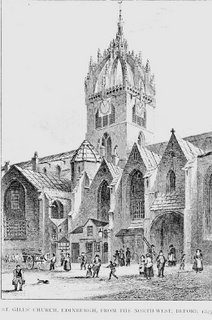Free Grace AND a Free Gospel. V
 Image: St. Giles Kirk, Edinburgh, as it was in Boston's day. The Assembly met in one of the Kirk's aisles.
Image: St. Giles Kirk, Edinburgh, as it was in Boston's day. The Assembly met in one of the Kirk's aisles.The General Assembly's 'Committee for the Purity of Doctrine' condemned The Marrow of Modern Divinity on five counts, as teaching:
1. That assurance is of the nature of faith.
2. That the atonement of Christ is universal.
3. That holiness is not necessary to salvation.
4. That the fear of punishment and the hope of reward are not proper motives of a believer's obedience.
5. That the believer is not under the commanding power of the Law.
The Assembly accepted the overture, and the Marrow was condemned as a dangerous book. Thomas Boston was horrified. The Marrow was not just another book to him, it had come as a messager of God. What was more, it had been condemned for teaching what it did not teach, the 'support' that the Committee had found for their charges being passages wrenched out of their contexts. The Marrow did not teach that Assurance was of the nature of faith, although some quotations from Luther seemed to do so. It did not teach a universal atonement, only a universal Gospel call. The Marrow did teach that holiness was not a condition of salvation, and that the proper motive for a believer's obedience is love to Christ, and it did teach that the believer is not under the commanding power of the law, but is under grace, and the Law is a rule of life to him.
Boston sought redress for the unjustice at presbytery and synod, at last appealing to the General Assembly of 1721. He and the other 'Marrowmen' gave a Representation to the Assembly, hoping for action. But the Assembly was disturbed by the terrible illness of the King's commissioner, and the matter was again taken up by the committee. Boston and his friends were examined by the committee on a dozen questions.
Of which more next time (God willing)
Labels: The 'Marrow of Modern Divinity'

0 Comments:
Post a Comment
<< Home